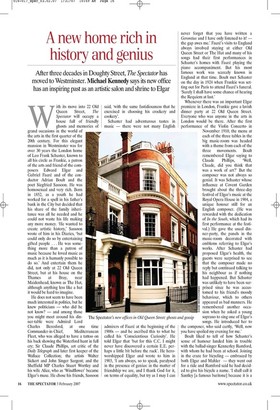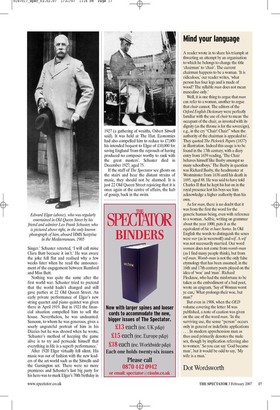A new home rich in history and genius
After three decades in Doughty Street, The Spectator has moved to Westminster. Michael Kennedy says its new office has an inspiring past as an artistic salon and shrine to Elgar Ivith its move into 22 Old Queen Street, The Spectator will occupy a house full of friendly ghosts and memories of grand occasions in the world of the arts in the first quarter of the 20th century. For this elegant mansion in Westminster was for over 30 years the London home of Leo Frank Schuster, known to all his circle as Frankie, a patron of the arts and friend of the composers Edward Elgar and Gabriel Faure and of the conductor Adrian Boult and the poet Siegfried Sassoon. He was homosexual and very rich. Born in 1852, as a youth he had worked for a spell in his father's bank in the City but decided that his share of the family inheritance was all he needed and he could not waste his life making any more money. 'He wanted to create artistic history,' Sassoon wrote of him in his Diaries, 'but could only do so by entertaining gifted people . . . He was something more than a patron of music because he loved music as much as it is humanly possible to do so.' And entertain them he did, not only at 22 Old Queen Street, but at his house on the Thames at Bray, near Maidenhead, known as The Hut, although anything less like a hut it would be hard to imagine.
He does not seem to have been much interested in politics, but he knew politicians — who did he not know? — and among those you might meet around his dinner-table were Admiral Lord Charles Beresford, at one time Commander-in-Chief, Mediterranean Fleet, who was alleged to have a tattoo on his back showing the Waterford hunt in full cry; Sir Claude Phillips, art critic of the Daily Telegraph and later first keeper of the Wallace Collection; the artists Walter Sickert and John Singer Sargent; and the Sheffield MP Charles Stuart Wortley and his wife Alice, who as Windflowee became Elgar's muse. He chose his friends, Sassoon said, 'with the same fastidiousness that he exercised in choosing his crockery and cookery'.
Schuster had adventurous tastes in music — there were not many English admirers of Faure at the beginning of the 1900s — and he ascribed this to what he called his 'Conscientious Curiosity'. He told Elgar that 'but for this C.C. I might never have discovered a certain E.E. perhaps a little bit before the ruck'. He heroworshipped Elgar and wrote to him in 1903, 'I am always, so to speak, paralysed in the presence of genius: in the matter of friendship we are, and I thank God for it, on terms of equality, but try as I may I can never forget that you have written a Gerontius and I have only listened to it! — the gap awes me.' Faure's visits to England always involved staying at either Old Queen Street or The Hut and many of his songs had their first performances in Schuster's homes with Faure playing the piano accompaniment. But his most famous work was scarcely known in England at that time. Boult met Schuster on the day in 1924 when Frankie was setting out for Paris to attend Faures funeral. 'Surely I shall have some chance of hearing the Requiem at last.'
Whenever there was an important Elgar premiere in London, Frankie gave a lavish dinner party at 22 Old Queen Street. Everyone who was anyone in the arts in London would be there. After the first performance of the Violin Concerto in November 1910, the menu at each of the three tables in the big music-room was headed with a theme from each of the three movements. Boult remembered Elgar saying to Claude Phillips, 'Well, Claude, did you think that was a work of art?' But the composer was not always so genial. It was Schuster whose influence at Covent Garden brought about the three-day festival of Elgar's music at the Royal Opera House in 1904, a unique honour still for an English composer. (He was rewarded with the dedication of In the South, which had its first performance at the festival.) He gave the usual dinner-party, the panels in the music-room decorated with emblems referring to Elgar's works. After Schuster had proposed Elgar's health, the guests were surprised to see that the composer made no reply but continued talking to his neighbour as if nothing had happened. But Schuster was unlikely to have been surprised since he was accustomed to his friend's moody behaviour, which to others appeared as bad manners. He remembered another occasion when he asked a young soprano to sing one of Elgar's songs. He introduced her to the composer, who said curtly, 'Well, now you have spoiled my evening for me.'
Boult liked to tell of how Schuster's sense of humour landed him in trouble with the ballad-singer Kennerley Rumford, with whom he had been at school. Joining in the craze for bicycling — embraced by both Elgar and Mahler — they went out for a ride and Rumford said he had decided to give his bicycle a name. 'I shall call it Santley [a famous baritone] because it is a and gossip Singer.' Schuster retorted, 'I will call mine Clara Butt because it isn't.' He was aware the joke fell flat and realised why a few weeks later when he read the announcement of the engagement between Rumford and Miss Butt.
Nothing was quite the same after the first world war. Schuster tried to pretend that the world hadn't changed and still gave parties at 22 Old Queen Street. An early private performance of Elgar's new string quartet and piano quintet was given there in April 1919. But in 1923 the financial situation compelled him to sell the house. Nevertheless, he was undaunted. Sassoon, to whom he was generous, gives a sourly ungrateful portrait of him in his Diaries but he was shrewd when he wrote, 'Schuster's method of keeping the game alive is to try and persuade himself that everything in life is a superb performance.'
After 1920 Elgar virtually fell silent. His music was out of fashion with the new leaders of the art world such as the Sitwells and the Garsington set. There were no more premieres and Schuster's last big party for his hero was to mark Elgar's 70th birthday in 1927 (a gathering of wraiths, Osbert Sitwell said). It was held at The Hut. Economies had also compelled him to reduce to £7,000 his intended bequest to Elgar of £10,000 for saving England `from the reproach of having produced no composer worthy to rank with the great masters'. Schuster died in December 1927, aged 75.
If the staff of The Spectator see ghosts on the stairs and hear the distant strains of music, they should not be alarmed. It is just 22 Old Queen Street rejoicing that it is once again at the centre of affairs, the hub of gossip, back in the swim.





















































 Previous page
Previous page